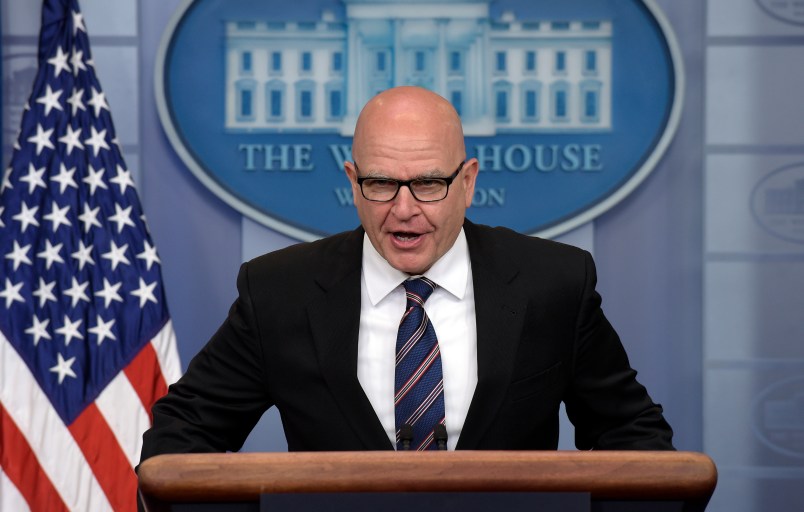We were just watching General McMaster’s press conference – which has taken the place of Sean Spicer’s briefing today. The key take away is that McMaster is essentially conceding the accuracy of last night’s reporting (first from the Post and later confirmed by other outlets) but saying that in the context it was okay. It was appropriate. Notably, when it comes to specifics, he is hiding behind classification to refuse to give further answers.
He also conceded that President Trump made the decision to reveal the information in the spur of the moment. When asked when Trump made the decision and whether his advisors were part of that decision, here are the exact words of response: “He made the decision in the context of the conversation.” In other words, spur of the moment decision, not something he and his advisers decided made sense in advance.
The gist here is that McMaster is saying yes Trump did it. He was entitled to do it. And I and other advisors were there when it happened and believe that substantively it was the right decision.
Later McMaster went further in denying a key point that no one from the White House had yet, so far as I know, denied. McMaster insisted that the President “in no way compromised any sources and methods.”
(For future purposes, I would say that is the clearest statement from McMaster that we’ll likely look back on as a knowing falsehood, with no give in the words as spoken.)
Then there was a key revelation just before McMaster left the podium.
He said this: “I should just make maybe the statement here that the president wasn’t even aware where this information came from. He wasn’t briefed on the source or method of the information either.”
To me this is not at all surprising. Sometimes even the President doesn’t learn about sources and methods unless there’s a specific need. Often it’s just not relevant in terms of what the President needs to know. Even normal Presidents get gobs of information every day about different parts of the world. But Trump isn’t normal. We know he insists on extremely toplined briefings. Just the most essential bullet points. So on its own, I don’t find this hard to believe.
McMaster’s point seemed to be that President Trump was not even in a position to reveal sources and methods because he didn’t know them. This is too cute by half. No one ever suggested he did. All the reporting has suggested that Trump revealed details from which sources and methods could be inferred.
The possibility this does raise is that Trump simply didn’t realize the information he mentioned was that sensitive or really, really secret. We simply don’t know.
The upshot is that I think we now know more than we did before McMaster’s Q&A that the Post story is accurate. The key is that McMaster says Trump was within his rights to make the decision (true, in terms of legality) and that he and two other top advisors believe it was in fact the correct decision (a subjective call we have no direct way to evaluate.)






